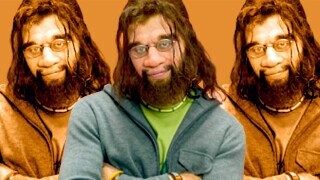'That's As Funny As Any Other Show': Nick Kroll Still Stands By 'Cavemen'

Many critics consider the short-lived 2007 sitcom Cavemen to be the worst TV show of all time – Nick Kroll and his friend Maya Angelou disagree.
In a recent CBS interview ahead of the premiere of Mel Brooks’ History of the World: Part II, Kroll reflected on the first big break he got after moving to Los Angeles, which would go down as one of the most reviled and ill-conceived comedy shows in TV history. Cavemen was Joe Lawson’s attempt to turn his award-winning and iconic GEICO commercials into a TV satire on race relations in America, and, miraculously, not a single suit at ABC Studios stopped him after hearing that pitch. Though most tastemakers, television viewers and human beings in general consider the pitiable prehistoric show to be a commercial, critical and artistic abomination, its biggest star says, “I still stand by it.”
Don't Miss
In the face of overwhelming disapproval, Kroll waxed poetic regarding Cavemen’s critics, saying, "My dear friend Maya Angelou said, basically, 'If you don't pick up the compliments, then you don't have to pick up the criticisms.'”

As we’ve previously discussed, Cavemen wasn’t a catastrophe because of any ineptitude on the part of its performers. Cavemen failed because of its disastrous, distasteful, deluded premise and all-those-descriptors-again writing – Lawson and his co-developers took the iconic insurance commercial and asked the question, “What if an entire race of Cro-Magnons continued to live alongside homo-sapiens all the way to the current epoch?” The all-white development team’s answer was, “Well, they’d probably have the exact same experiences as black people.” The Cavemen writers clumsily tracked their cavemen characters to the African-American experience with tone-deaf takes on topics as race mixing, mixed-race adoptions, workplace discrimination, racist mascots, race traitors, and racial profiling. The ABC sitcom tackled these subjects with the subtlety of an actual caveman smashing the audience over the head with his club.
"Beloved commercials, despised show," Kroll succinctly said of Cavemen. "It's not bad. It's funny … I still stand by it. I'm like, 'That's as funny as any other show.'" In Kroll’s defense, Cavemen certainly had the structure and style to match any uninspired late-2000s network sitcom, it simply had such an insanely tone-deaf premise and the bizarre baggage of being an insurance-commercial-turned-satire-series dragging it back down into the cave from whence it came.
When asked if he felt the show was a failure, Kroll replied, “It didn't feel like personal failure. It felt like I'm participating in a failure. It's different." Despite his earlier defense, Kroll is at least able to admit that Cavemen failed – in fact, it failed so hard that GEICO took out an ad in the Super Bowl the following year effectively apologizing for its existence.
The advice of “ignore the critics and follow your passion” is as lucid coming from Kroll as it surely was when his very close confidant Angelou told it to him. Perhaps Lawson and Kroll were attempting to honor the award-winning activist and poet who spent her life chronicling the complexities of race in America by making a TV show that was the exact opposite of everything she’d ever written.